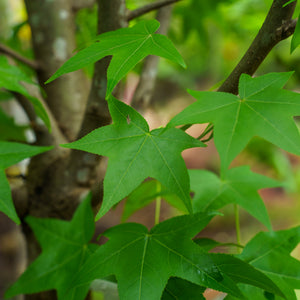The Sweetgum Guide
Sweetgum (Liquidambar styraciflua) is a stately, deciduous shade tree valued for its star-shaped leaves, symmetrical form, and dramatic fall color. A native of the southeastern United States, it adapts well to a variety of climates and soils, offering seasonal beauty and structural impact in parks, large lawns, and street plantings. Though known for its spiky seed pods, sweetgum remains a popular choice where space permits and fall brilliance is desired.
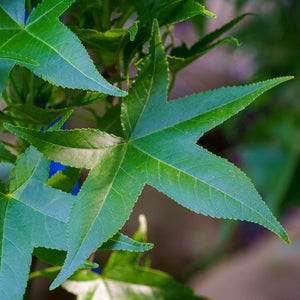
About
Liquidambar styraciflua is a large, pyramidal tree that typically grows 50 to 75 feet tall, with some specimens reaching over 100 feet in ideal conditions. Its defining features include:
- Star-shaped, glossy green leaves with five to seven lobes that resemble maple leaves.
- Outstanding fall color, ranging from yellow and orange to deep red and purple—often all on the same tree.
- Woody, spiked fruiting balls, known as gumballs, that persist into winter.
Sweetgum is a true hardwood, historically used in furniture making, veneers, and flooring. Its strong, symmetrical shape and upright branching habit make it a popular shade tree when properly sited.
Improved cultivars have expanded its versatility:
- 'Rotundiloba': Nearly fruitless variety with rounded lobes and excellent fall color.
- 'Slender Silhouette': Columnar form for narrow spaces, reaching 40–50 feet tall but only 5–6 feet wide.
- 'Cherokee': Compact growth with rich red and orange fall foliage.
- 'Happidaze': Seedless selection with upright branching and a clean habit.
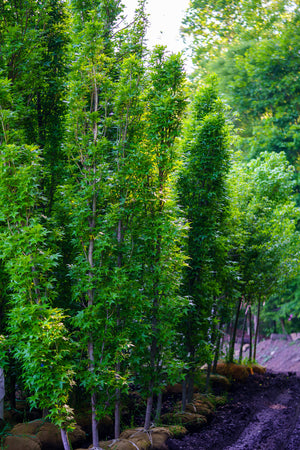
PLANTING
USDA Hardiness Zones: Hardy in Zones 5–9, depending on cultivar and microclimate.
Soil: Prefers deep, moist, acidic soil but adapts to clay and sandy conditions. Avoid shallow or excessively alkaline soils.
Sunlight: Full sun is essential for best growth and fall coloration.
Watering: Requires regular watering during establishment. Once established, it is moderately drought tolerant but prefers consistent moisture.
Spacing: Allow 30–50 feet between trees. Slender forms may be planted closer for vertical accents.
Planting Time: Plant in spring or fall when the soil is workable and temperatures are mild.
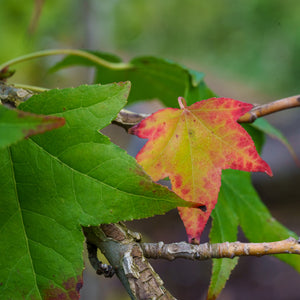
CARE
Watering: Deep water weekly during dry periods, especially in the first three years. Mulching helps retain moisture.
Fertilizing: Apply a balanced fertilizer in early spring if growth is slow or leaves show signs of nutrient deficiency.
Pruning: Minimal pruning required. Remove dead, damaged, or crossing branches in late winter. Shape young trees early to promote strong branching.
Pests and Diseases: Generally resistant to serious issues, but may occasionally experience leaf spot, canker, or scale. Monitor for early symptoms and treat as needed.
Mulching: Mulch annually with 2–3 inches of organic material to protect the roots and suppress weeds. Keep mulch away from the trunk.
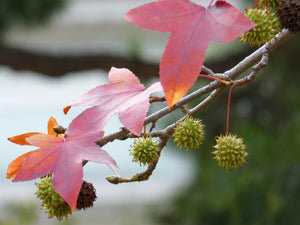
HOW TO USE
Shade Tree for Large Lawns: Sweetgum’s broad canopy offers dense shade, making it ideal for open yards, estate plantings, and public greenspaces.
Fall Color Feature: Plant as a focal point in the landscape or in groupings along streets and walkways where autumn foliage can be fully appreciated.
Vertical Accent: Columnar cultivars like 'Slender Silhouette' are perfect for tight spaces or narrow corridors, offering height without excessive spread.
Wildlife Habitat: The gumballs feed birds and small mammals during winter. Their persistence on the tree adds visual texture to the dormant season.
Naturalized Areas and Parks: Sweetgum’s adaptability and tolerance for seasonal flooding make it suitable for large-scale plantings, buffer zones, and reforestation projects.
Urban Settings: With proper root space and improved cultivars, sweetgum can perform well in urban landscapes. Use in medians or along sidewalks with seedless forms to minimize cleanup.

Common Questions
Is sweetgum a hardwood? Yes, sweetgum is a true hardwood with a dense grain, used in furniture, cabinetry, and veneers.
What is sweetgum good for? It is valued for shade, fall color, wildlife support, and as a durable timber species. It also serves as an attractive, long-lived specimen in the landscape.
How big does a sweetgum tree get? Typically grows 50–75 feet tall with a 30–50 foot spread. Some cultivars are more compact or narrow in form.
How fast do sweetgum trees grow? Moderate growth rate—about 1 to 2 feet per year depending on site conditions.
How to identify a sweetgum tree? Look for star-shaped, glossy leaves, corky ridges on young branches, and spiky seed balls hanging in clusters. Fall foliage is multi-colored and vibrant.
Do sweetgum trees need full sun? Yes, full sun is required for strong growth and optimal leaf color.
What are the balls on a sweetgum tree? These are the seed pods or fruit—woody, spherical structures covered in short spines. They persist through winter and can be messy in high-traffic areas.
Conclusion
Sweetgum is a classic American shade tree that blends beauty, resilience, and utility. With starry leaves that light up in fall, a strong architectural presence, and cultivars that reduce or eliminate messy fruit, it brings long-term value to the landscape. Whether you’re planting for autumn color, urban design, or reforestation, sweetgum offers both charm and substance in every season.
The Sweetgum Collection
Sold Out
Sold Out
Sold Out

